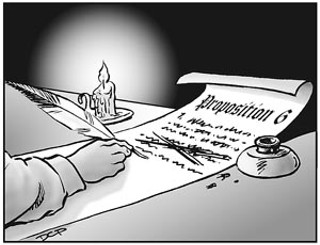A Question of Fairness
Austin voters will have another chance to broaden city insurance coverage
By Wells Dunbar, Fri., March 24, 2006

City of Austin Municipal Election
Election Date: May 13
Early Voting: May 1-9
On the Ballot:
• Mayor
• Austin City Council (Places 2, 5, 6)
• AISD Board of Trustees (six seats)
• ACC Board of Trustees (three seats)
• City Charter Amendments (see p.30)
This week we take a look at the proposed charter amendments, with a particular focus on Prop. 6; next week we'll consider the candidates for the various offices, along with continuing coverage of other election news.
According to persistent local legend, "The People's Republic of Austin" is a proudly progressive blue island in a conservative red Texas sea. Last November, Proposition 2, the amendment that made the already prohibited condition of same-sex marriage even more illegal by embalming it into the Texas Constitution, sailed calmly to passage everywhere statewide – except in Travis County, where it went down by a margin of almost 20%.
But despite Austin's presumed yellow-dog bona-fides, there was a time – not too long ago – when Christian conservatives dealt progressive local forces a resounding defeat, on pretty much the same issue. The year was 1994, when a group called Concerned Texans petitioned Prop. 22 onto the municipal ballot and then onward to victory. The proposition repealed a forward-thinking city council initiative, enacted the previous September, offering insurance benefits to the unmarried partners of city employees or other adults living in their homes. In short, it had a brief life as the first domestic partner benefits package in the state, yet the following spring, it was voted down by a two-thirds margin – with the help of 20,000 Austinites whose signatures had initially placed it on the ballot. The defeat abruptly forced local progressives to distinguish Austin's rhetorically liberal ethos from the actual facts on the ground.
Cheap at the Price
"A very scarring experience" is how Council Member Brewster McCracken describes the 1994 benefits battle. "I thought if we had this to look back on, we'd say, 'We wouldn't have done that.'" Now McCracken, along with colleagues Betty Dunkerley and Lee Leffingwell, is doing just that with the newly hatched Proposition 6, which if approved by Austin voters in the May 13 city election, would repeal the ban placed on domestic-partner insurance. With the city charter eligible for amendment only once every two years, McCracken considered bringing this back for a vote now, once it became clear other propositions would make the ballot. "Domestic partner benefits leaped off the page," says the Place 5 council member. "The community has grown older, wiser, and fairer," he continues. "We're definitely more tolerant than we were in 1994."
"Almost 13 years have gone by on the issue of domestic partnerships and benefits," says former state representative Glen Maxey, the gay-rights advocate who spearheaded the No Nonsense in November campaign against Prop. 2. "This nation, and especially this city, has moved light years ahead. We've debated all those big issues." To Maxey, domestic partner and expanded insurance coverage has become a common-sense proposal, "not just a gay and lesbian issue."
"The No Nonsense campaign did a very good job of getting public leadership involved in a good way," continued McCracken, hoping for a carryover of that will and momentum in May. But like Maxey, he reiterates that the proposal will affect more than the city's gay employees or their partners. It would also extend the option for employees to buy insurance coverage for any adult they're living with, be it a partner, parent, grandparent, or grown child. Just what the insurance program itself will look like is not yet finalized – all Prop. 6 literally does is repeal the charter language stating who is and isn't eligible for coverage, and deletes a provision defining "spouse" as "the husband or wife of the employee." But supporters envision Austin's system as modeled after Travis County's existing employee insurance program.
As it happens, soon after Austin's hard-fought benefits repeal in 1994, Travis Co. quietly instituted an insurance plan allowing for domestic-partner coverage. Several of Austin's largest employers, like Dell, IBM, and AMD offer similar programs, as does the city of Dallas. (In 2001, after Houston mayor Lee Brown suggested an extension of benefits to partners of gay city employees, an ad hoc group called "Houstonians for Family Values" collected enough signatures to place on the ballot a ban on future domestic partner benefits. Although an opposition group, "People for a Fair Houston," out-fundraised the amendment's backers by a large margin, the measure passed with 53% of the vote – effectively ending the argument before it began.)
Travis County has in place what is popularly referred to as a "plus one" program; Dan Mansour, the risk and benefits manager for the county's human-resources department, says that in addition to a spouse, another adult can be enrolled in an employee's program, at the same cost to the employee. Nonmarried adults signing up for coverage must complete an affidavit stating they have lived in the same household as the employee for at least six months, and contribute in some way to the upkeep of the quarters; the statement must then be notarized and renewed for each year of coverage. The county has a workforce of 3,600, Mansour says, and 6,700 adults on the insurance rolls. Of those, about 70 or 80 are nonspousal adults covered by employees – and only some of those are domestic partners – "not a large percent," according to Mansour. The cost of the plus-one program is about 2% of the insurance budget, Mansour says, less than half a million of the county's annual $24 million insurance budget. "It's a very basic and easy to administer program," concludes Mansour.
Preventive Medicine
The program would have been invaluable to Beverly Bottorff-Patton, a quality improvement coordinator and city employee with Austin-Travis Co. EMS since 1997. Last summer, her partner of 15 years was diagnosed with a parathyroid tumor. Normally the size of a grain of rice, by the time the tumorous but benign gland was removed in November, it was as large as a plump grape. In that window of time, the couple spent $25,000 on surgery, hospital stays, tests, and medication. Their financial situation was already precarious after losing their home to a fire four years ago, so the medical treatment completely drained their savings account. Without insurance, the couple enrolled in a shadowy program through which they paid up to $500 a month for discounts on procedures – only to learn later they could earn discounts themselves by paying in cash. "We lost our life savings because of this," says Bottorff-Patton. "It was just like waiting for the next shoe to drop – what do you pay first? It's a sense of constant dread."
Bottorff-Patton says other city employees are in similar situations, or courting that danger. "I'm not asking for anyone to pass judgment on how I live my life," she continues. "It's a difference between preventative medicine or reactive medicine. People who are uninsured or underinsured – who pays for that down the road? The taxpayers." McCracken estimates the annual cost to the city of adding additional adults to its insurance at $200,000 for current employees, and $50,000 for retirees. Austin Human Resources director Cathy Rodgers says that cost was estimated "using the participation from last time – around one percent." Out of about 10,000 city employees, the number would come to 100. (When the program ended in 1994, just under 100 city employees were participating, and only 29 of those registered same-sex partners; the city's estimate then was approximately $140,000 annually.)
Taking the Risk
So far, the measure has garnered support from the city's organized workforce, including the Austin Association of Professional Firefighters and the Austin Police Association. "We believe it's about people's access to health care," says police union president Mike Sheffield, among those who opposed the Prop. 22 ban of the program in 1994. "I had some officers that were actually brave enough to testify against the ban back then. ... It makes no sense to oppose it when you have the opportunity to put more people under health insurance," he continues, describing a fellow officer who shares his home with his seriously ill brother. "Under the plus-one plan, he could add anyone in his house." Whatever the specific family circumstances, Sheffield sees the issue as one of fairness. "These officers go out and put their lives on the line – to penalize these officers for who they share their home or their bedroom with is ridiculous."
No organized opposition to the proposition, in the vein 1994's Concerned Texans, has yet surfaced, although the election is still two months away. Sally Aiello, executive director of the Travis Co. Republican Party, says the local GOP has no current position on the proposal and probably will not be adopting one. Thus far, the most high profile and vocal opponent of the measure happens to be a former cop: council member and Mayor Pro Tem Danny Thomas, who will be running for the mayor's seat on the same ballot as Proposition 6. Thomas is also the only council member who supported the state constitutional ban on gay marriages and unions last November, and when Prop. 6's repeal of the ban on same-sex insurance coverage was considered for council approval earlier this month, Thomas made clear his disapproval. "I think to be fair, if we are going to bring back an amendment that has been voted down by the citizens, I think we need to go and look at more detail than we did," said Thomas, adding that while everyone deserves coverage, "there's always other ways of providing it" – which ways those might be, he didn't specify. Thomas also raised the issue of cost – as all Prop. 6 does is allow for a program, and not institute one, the true cost to the city won't be known until the city manager prepares the 2007 fiscal year budget. Finally, Thomas said bluntly he feels the amendment stands in direct conflict with the state's Prop. 2, and he opposes it on moral grounds. "I think everybody on this council knows how I feel about ... same sex marriage," he concluded.
"Always, somebody's gonna do something," says Maxey, when asked about potential opposition, noting that Texas received a "fairly good understanding on the most difficult gay and lesbian issue – marriage – just a few months ago." But as he follows the debate of recent years, Maxey says he's come to believe that "the nation has moved from 'I don't know about gay marriage,' to thinking 'domestic partnerships make sense' ... a compromised, center position."
The vote is "a risk," concludes McCracken, but perhaps possibly less so following Prop. 2's recent defeat in Austin. However, he continues, "We have a situation that is unfair right now, one that seriously harms families of city employees. I believe it's a risk worth taking." ![]()
Got something to say on the subject? Send a letter to the editor.








